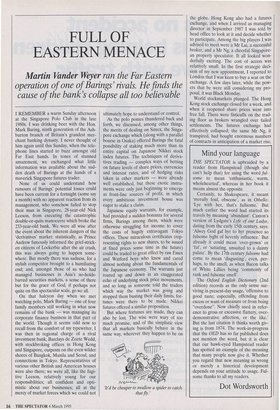Mind your language
THE SPECTATOR is upbraided by a reader from Hampstead (though she can't help that) for using the word ful- some to mean 'enthusiastic, warm, wholehearted', whereas in her book it means almost the opposite.
Certainly, to Shakespeare, it meant `morally foul, obscene', as in Othello: `Lye with her, that's fullsome.' But much earlier the word had started its travels by meaning 'abundant'. Caxton's version of Lydgate's Lyfe of our Ladye, dating from the early 15th century, says: `Alwey God gaf hyr to hyr presence so fulsome lyght of hevenly influence.' But already it could mean 'over-grown' or 'fat', or 'satiating, unsuited to a dainty palate'. By the 17th century fulsome had come to mean 'disgusting', even, per- haps, to the smell, as when Bacon talks of White Lillies being 'commonly of rank and fulsome smell'.
The Oxford English Dictionary (2nd edition) records as the only sense sur- viving in present-day usage, 'offensive to good taste; especially, offending from excess or want of measure or from being "overdone". Now chiefly used in refer- ence to gross or excessive flattery, over- demonstrative affection, or the like.' But the last citation it thinks worth giv- ing is from 1874. The work-in-progress that the OED has so far published does not mention the word, but it is clear that our hawk-eyed Hampstead reader has spotted an example of the meaning that many people now give it. Whether you regard that new meaning as wrong or merely a historical development depends on your attitude to usage. Ful- some thanks to all my readers.
Dot Wordsworth


























































 Previous page
Previous page